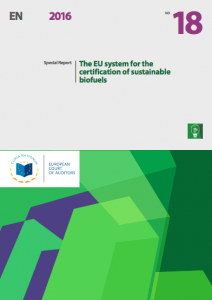 A new report released by the European Court of Auditors finds that there are several gaps in the European Commission’s existing biofuels sustainability certification framework even thought the study only looked at four member states. In response to the report, the European renewable ethanol association (ePure) agrees with the assessment that the sustainability framework for biofuels in Europe can, and should be, strengthened further to ensure that only the most sustainable biofuels are promoted via EU policy in 2020 and beyond.
A new report released by the European Court of Auditors finds that there are several gaps in the European Commission’s existing biofuels sustainability certification framework even thought the study only looked at four member states. In response to the report, the European renewable ethanol association (ePure) agrees with the assessment that the sustainability framework for biofuels in Europe can, and should be, strengthened further to ensure that only the most sustainable biofuels are promoted via EU policy in 2020 and beyond.
Under the Renewable Energy Directive, European Union (EU) Member States can only use biofuels certified as sustainable to reach their 2020 target of sourcing 20 percent of the energy in transport from renewable sources. Most biofuels placed on the EU market are certified through voluntary schemes recognized by the European Commission, but the auditors concluded that the schemes suffer from weaknesses in the Commission’s recognition procedure and in its supervision.
In their recommendations, the auditors call on the Commission to ensure that the certification processes:
- assess how much biofuel production entails significant socioeconomic risks and indirect land ‐use change;
- verify that feedstock producers comply with environmental requirements for agriculture; and
- provide sufficient evidence of the origin of waste and residues used for biofuels.
The report recommends that the Commission:
- assess whether the schemes’ governance reduces the risk of conflict of interest and are sufficiently transparent;
- check that the operations of the certified schemes comply with the standards presented at the time of recognition and that the schemes set up transparent complaints systems; and
- seek evidence from Member States on the reliability of their biofuels statistics and harmonize the definition of waste substances.
“We are the only sector in the entire world which actually apply any type of mandatory sustainability rules for our products,” said Robert Wright, ePURE secretary-general. “The GLOBIOM study clearly shows that there are a number of good biofuels, including European ethanol, that are entirely sustainable and the Commission should fully back these biofuels in its post-2020 policies. European ethanol has 63 percent of GHG savings, low land use impacts, and no negative social consequences or effects on food prices – it’s the type of good biofuel that Europe should support.”

